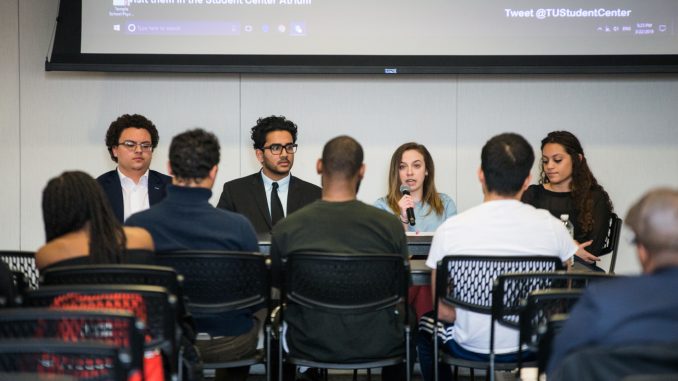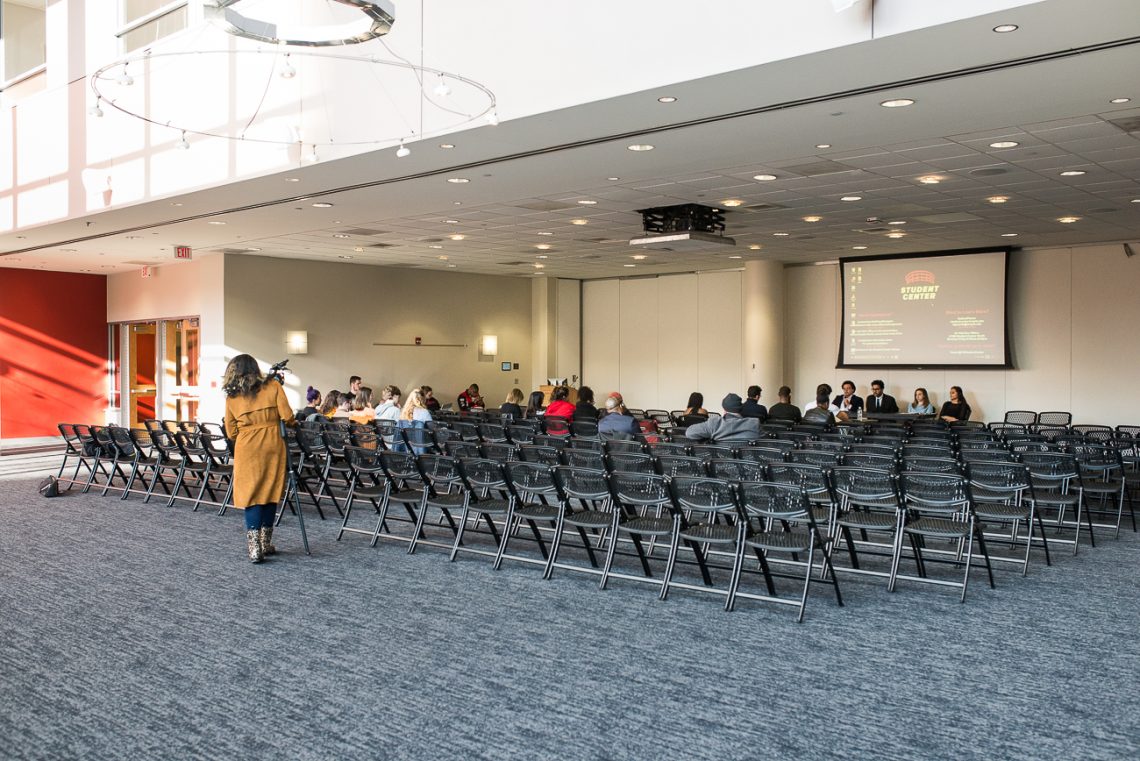
Temple Student Government’s at-large candidates, who do not have challengers and will be automatically elected into their seats in Parliament, shared their positions on several student and TSG issues on Friday evening.
The event was TSG’s first platform provided for Parliament candidates to speak on their interests, and featured four hopeful at-large representatives who will sit in the 37-seat body.
“It was like a Q&A rather than a debate,” said Cameron Kaczor, IgniteTU’s vice president of external affairs. “…It’s effective in the fact that students can know what [candidates’] thoughts are, and also what their platform points are, what their passions are.”
Four out of five of TSG’s at-large Parliament candidates discussed their platforms and thoughts on the body’s function during Parliament’s only debate, which was moderated by members of Temple’s Black Law Students Association and TSG’s Ethics Board. Candidates Amelia Rothermel, Arshad Shaik, Drew Gardner and Jessica Saunders attended the debate, while Issa Kabeer was not present.
About 20 people attended the debate, and most audience members were part of TSG’s current administration or of the BecomingTU and RiseTU executive team tickets.

There are five total at-large seats in Parliament, said Morrease Leftwich, TSG’s chief judge, meaning the candidates will have no contest for their seats. There are eight Parliament candidate applications submitted for the 37 available seats, Leftwich said while asking a question about TSG’s struggle to involve students.
“The only reason why I would say that I’ve been involved with student government is the fact that I went out of my way to find out information about student government,” said Shaik, a freshman neuroscience major and current honors students representative. “There hasn’t been much times when I’ve noticed TSG pop up on my feed, on whatever social media platform that I’m using.”
“I’ve literally never heard anything about TSG my two years being at Temple, ever,” said Gardner, a sophomore political science and psychology major.
Other than the at-large seats, there are only three Parliament candidates running for international, multicultural and disability resource services representative positions. The remaining 29 seats range from representatives for all of the university’s colleges to representatives for international and LGBTQIA+ students, which TSG did not receive applications for.
Parliament struggled to fill seats during the 2018-19 academic year, and had eight remaining seats halfway through representatives’ year-long terms, The Temple News reported in November 2018. BecomingTU, one of the executive teams running for the 2019-20 academic year, suggests making Parliament inactive for the fall semester to work with the Executive Branch on its internal operations.
BecomingTU would request, not force, Parliament to be inactive, said Marissa Martini, BecomingTU’s chief strategist. During the first executive team debate on Thursday, candidates confirmed that it would be unconstitutional for the Executive Branch to declare Parliament inactive without a vote from TSG’s senior leadership team, which includes Parliament members, The Temple News reported.
“It would be a request to go inactive so that members, particularly members who are running and who are elected, would be able to work together with [the Executive Branch] and Ethics [Board] to make sure that either seats get filled or amendments get passed,” added Martini, who is also IgniteTU’s chief of staff.
RiseTU believes making Parliament inactive would decrease the body’s productivity overall.
The at-large Parliament candidates agreed that they would not like to see the body they’re going to be voted into inactive for their first semester in office.
“I would think that one of the missions is to advocate for the students and be an organization that speaks on behalf of the students, and if you take away the positions that are actually doing that, then I can’t see what the entire organization would even be then,” Gardner said.
The debate’s first question asked the four candidates about the prevalence of sexual assault on campus, and what resources for survivors should be improved. The Ethics Board, BecomingTU and RiseTU did not mention sexual assault at the debate on Thursday.
Saunders, a freshman communication and social influence major, suggested creating a page with the university’s sexual assault resources for professors to include in their syllabi, similar to standard pages for academic dishonesty that appear in most classes’ outlines. Rothermel, a sophomore criminal justice major, said she has a similar idea.
“The best way to go about this is through making those resources easier for students to get to,” Saunders said.
There are already many resources, including the Title IX office, for students who are victims of sexual assault, said Gardner. However, there need to be more employees dedicated to the offices that do exist, he said, referencing that the Main Campus Title IX office has one coordinator, Andrea Seiss, who handles all Title IX complaints.
All four candidates also mentioned mental health resources as an important focus for their campaigns for Parliament. Tuttleman Counseling Services has too many limitations, the candidates agreed, like inconvenient walk-in hours, maximum hours and not enough funding.
Shaik said Tuttleman should implement an online counseling service for when hours aren’t available, and for students who aren’t comfortable physically walking into a center to seek help. Tuttleman currently has an online mental health screening service and the Resiliency Resource Center Online, which offers information about maintaining good mental health and provides links to organizations outside the university.
“I feel like there’s a lot of people who need help, but won’t want to go to the trouble of actually going into the services and actually walk to the area itself,” Shaik said. “By having an online platform, it creates ease for a lot of people who actually need it.”
The candidates appeared unprepared, said Kaczor, and they should have done research on TSG’s internal operations in order to answer questions about Parliament’s effectiveness and issues within the organization.
“If you’re going to come to a debate and you are representing students, you should know everything about what you are running for,” she added. “Parliament is the middleman between the executive branch and the student body, and so if you are going to be a voice for the students, you need to know what you’re getting yourself into.”
Saunders passed over questions about mandatory General Assembly meetings and TSG’s Ethics Board, and Rothermel said she didn’t know what the Ethics Board does. Garner and Shaik attributed students’ lack of knowledge about TSG to the organization’s outreach efforts.
The next debate of the election season will be between executive campaigns BecomingTU and RiseTU on April 1. Students will vote for the Executive Branch and Parliament on April 2 and 3, and the new TSG administration will be announced on April 4.



Be the first to comment